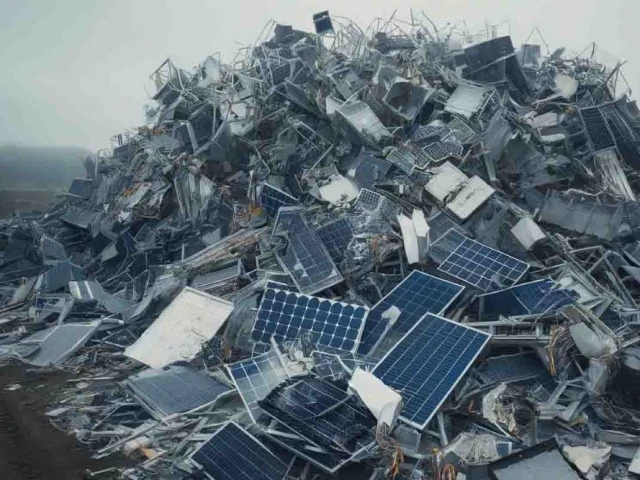Lahore:
The energy crisis and the rise in electricity prices in Pakistan have attracted citizens to alternative sources, the most important of which is solar energy. From the installation of solar panels on roofs to large solar parks, the sector is growing quickly. Critics, however, warn that torrential rains, floods and poor waste management due to climate change could transform the system into a new environmental crisis.
According to Dr. Salman Tariq, environmentalist and assistant professor at the University of Punjab, if solar panels are overwhelmed in water, their silicon cells and frames become broken, while electrical connections become ineffective. “In particular, batteries can cause circuits or fires.
According to data, Pakistan imported millions of solar panels and batteries with thousands of megawatts during the last financial year. Since the average lifespan of solar panels is 20 to 25 years and that of batteries is five to 10 years, the waste generated due to their downgrading is likely to increase multiple in the years to come. Experts believe that if the management structure is not created now, the crisis could intensify like current electronic waste (electronic waste).
Pakistan is already under pressure from electronic waste. According to a report published by the Global E-Waste Monitor, Pakistan generates around 400,000 tonnes of electronic waste each year, including mobile phones, computers and refrigerators. Punjab is the most affected province in this regard, where former goods are found in the informal markets of junk food and are eliminated in a dangerous manner. The use of acid and fire to extract metals on these markets is dangerous not only for the environment but also for the health of workers and children.
According to former geologist Dr Naeem Mustafa, a solution to this problem is urban exploitation, under which precious metals can be extracted from the old equipment launched in cities in a modern and safe manner. “If this process is organized, the economy can benefit from it and the environment can be saved from damage,” informed Dr. Mustafa.
Mian Abdul Khaliq, an importer of solar panels, revealed that Pakistan needed an emergency of solar waste management and recycling structure, otherwise the alternative energy system will lose its environmental advantages. “The recycling centers will have to be set up to recover aluminum, copper and silicon from missing panels and batteries, which should receive tax incentives so that investors enter the sector,” said Khaliq.
According to the environmental lawyer Altamash Saeed, the waste directive, electrical and electronic equipment is strictly applied in the European Union and there are clear recycling laws in Japan, but there is little regulation in this regard in Pakistan. “Internationally, the Basel Convention regulates transfective transfers of hazardous waste, but its implementation in Pakistan is low,” said Saeed.
Dr. Tariq stressed that the government should adopt the principle of extended responsibility for manufacturers to give business responsibility for the post-use phase of their products. “If this system is established, not only will the environment be protected, but new job opportunities will also be created. Otherwise, the clean energy dream could turn into a new climate crisis, “warned Dr. Tariq.
Ali Ijaz, deputy director of the Punjab Environment Protection Agency, revealed that there was currently no complete electronic waste management policy in Pakistan, but work was underway, and an effective strategy will be introduced soon. “New safety standards have been set for solar installations so that the panels can withstand the effects of rain and strong winds,” said Ijaz.




